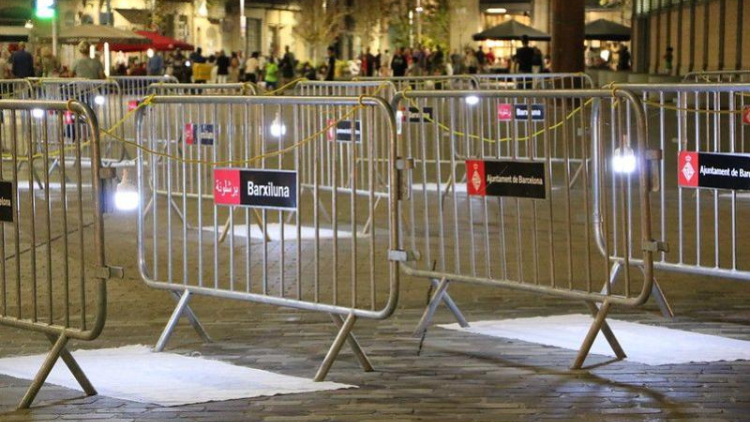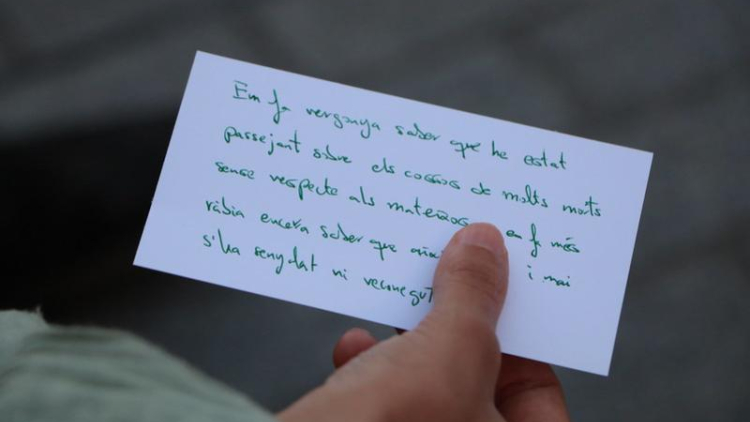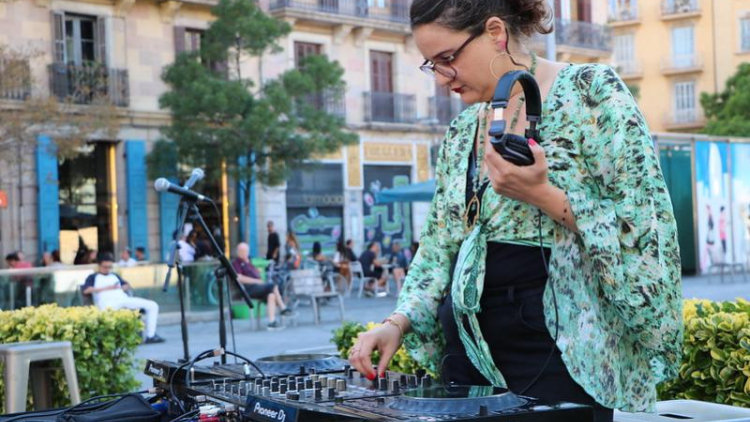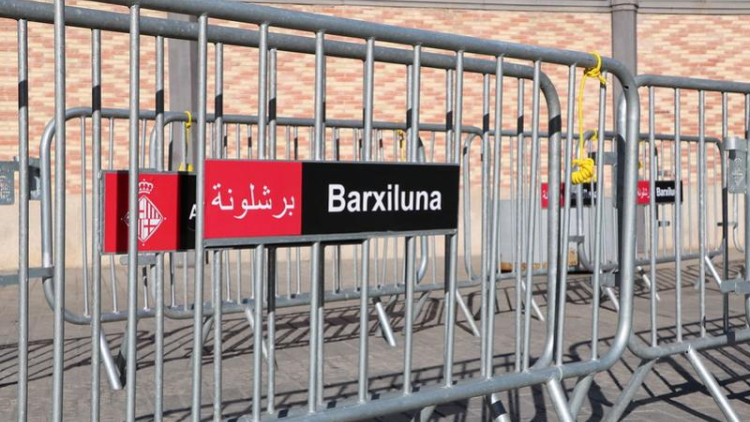ISLAM | #Barxiluna “This is an event inviting reflection on issues that continue to affect us today, as racialised individuals and Muslims”, Fatiha Elmouali
“Barxiluna برشلونة: memory and forgetfulness of the city's Islamic past and present” is a series of activities aimed at highlighting Barcelona's Islamic legacy. The latest activity in this series was co-organised by the Office for Religious Affairs (OAR), the Espai Avinyó and BornLab, the El Born Centre de Cultura i Memòria’s community mediation programme, as part of its “Estar, narrar, 7, 8” cycle. It focused on bringing visibility to the Islamic heritage in the city’s historical public spaces through an artistic installation in Plaça Comercial del Born pointing out the location of an 11th-century Muslim burial site.
As part of the programme “Barxiluna برشلونة: Memory and forgetfulness of the city’s Islamic past and present”, several activities have been organized so far, with the aim of inviting reflection on and highlighting Barcelona’s Islamic legacy. Two of these activities, “History and heritage” and “(Im)possible museums: from historical narratives to the museographical story”, have put the focus on the Islamic perspective in history, museography and heritage, to highlight the links of the past and present of the city’s Muslim community. Two other activities, “The Curriculum” and “The Hidden Curriculum”, were set within the educational sphere for a dialogue on the conveyance of knowledge of the Islamic past established in the educational curriculum, putting the emphasis not just on the narratives that the text books give on the history of Islam but also on the issues that are left out of the discourse.
This latest activity put the focus on public spaces. The “Memory and public space” activity, co-organized by the Espai Avinyó and the Office for Religious Affairs (OAR), together with the El Born Centre de Cultura i Memòria’s community mediation programme, BornLab (within the framework of its “Estar, narrar, 7, 8” cycle), was held on 23 September as part of the La Mercè 2023 festivities. It involved an artistic installation and performance, with the social educator Yousra Touri, the reception officer and PhD in Education Sciences from the UAB Fatiha Elmouali, the actor and activist Abdel Aziz El Mountassir and the DJ Souمeya taking part. Also taking part were the ERRO Grupo collective, who curated the event and designed its urban installation.
The star attraction of “Memory and public space” was Barcelona’s only documented Islamic funeral site, discovered under the medieval structures of Plaça Comercial del Born. The importance of this space rests on its bearing testimony to a large Muslim community in the city following the demise of the Muslim government there, which is why it sheds light on and brings visibility to the community’s presence in the city’s history. The artistic event focused on reclaiming this past, since “nothing mentions this history, reigning here are silence, oblivion and an invisibilisation of part of the history of ‘this society, of this country”, comments Fatiha Elmouali.
Remarkably participatory, the event began with an introduction from Fatiha Elmoauli and Yousra Touri, who reflected on the need for citizens to be active subjects of the dissemination and construction of Barcelona’s historical discourse. After that, the two moderators went on to read out a manifesto, explaining the process of the site’s discovery in the 1990s, and subsequent study, presented by Born CCM in 2021, which encouraged the organizers and participants to prepare ways of reclaiming it in the city’s history.
The manifesto expressed how the past reflects the present and vice versa. It was during the 1990s, when the site was discovered, that the city was at the height a reconstruction process for the Olympic Games, carried out largely by immigrants. That same collective suffering on a daily basis pointed out, “the link of a few chains similar to the ones wrapped around the feet of individuals buried in the site, symbolic chains that reproduce a construction of otherness based on discourses which tend to generalize and lead to either the demonization and criminalization or, by contrast, the romanticization and paternalisation of the existence of certain communities, and reproducing dynamics that pose obstacles to empathy between individuals”, proclaimed Fatiha Elmouali as she read out the manifesto.
After the reading, the organizer team went on, to the sound of music, to install two fences at each of the points where people had been buried in the site. Members of the public were invited to put a white piece of cloth between these fences, which would be ‘lit up afterwards by a small lamp hanging from the fences. This was immediately followed by a performance from Abdel Aziz El Mountassir, where the artist and activist delivered a soliloquy in Arabic and Spanish, wearing chains on his foot and neck. To conclude this second, more artistic part, Yousra Touri read out a text of poetry. During the reading, the audience were given pieces of paper to write their reflections, questions and requests on and which they then deposited in a transparent box that would constitute a memorial of the event, where one of the pieces of cloth used in the installation was introduced and the manifesto read out.
When the reading finished, an open microphone space was set up, where representatives of institutions and collectives, as well as individuals, were able to share reflections and requests. Fatiha Elmouali spoke one last time to conclude the event, with a protest speech, calling on the authorities to recognize the Muslim community and its costumes as part of Barcelona’s society, and demanding effective and material measures, such as more Muslim cemeteries and real mosques, because “without such recognition, the institutions are saying they only want us as workers”. Finally, the activity ended with a music session from the DJ Souمeya.







